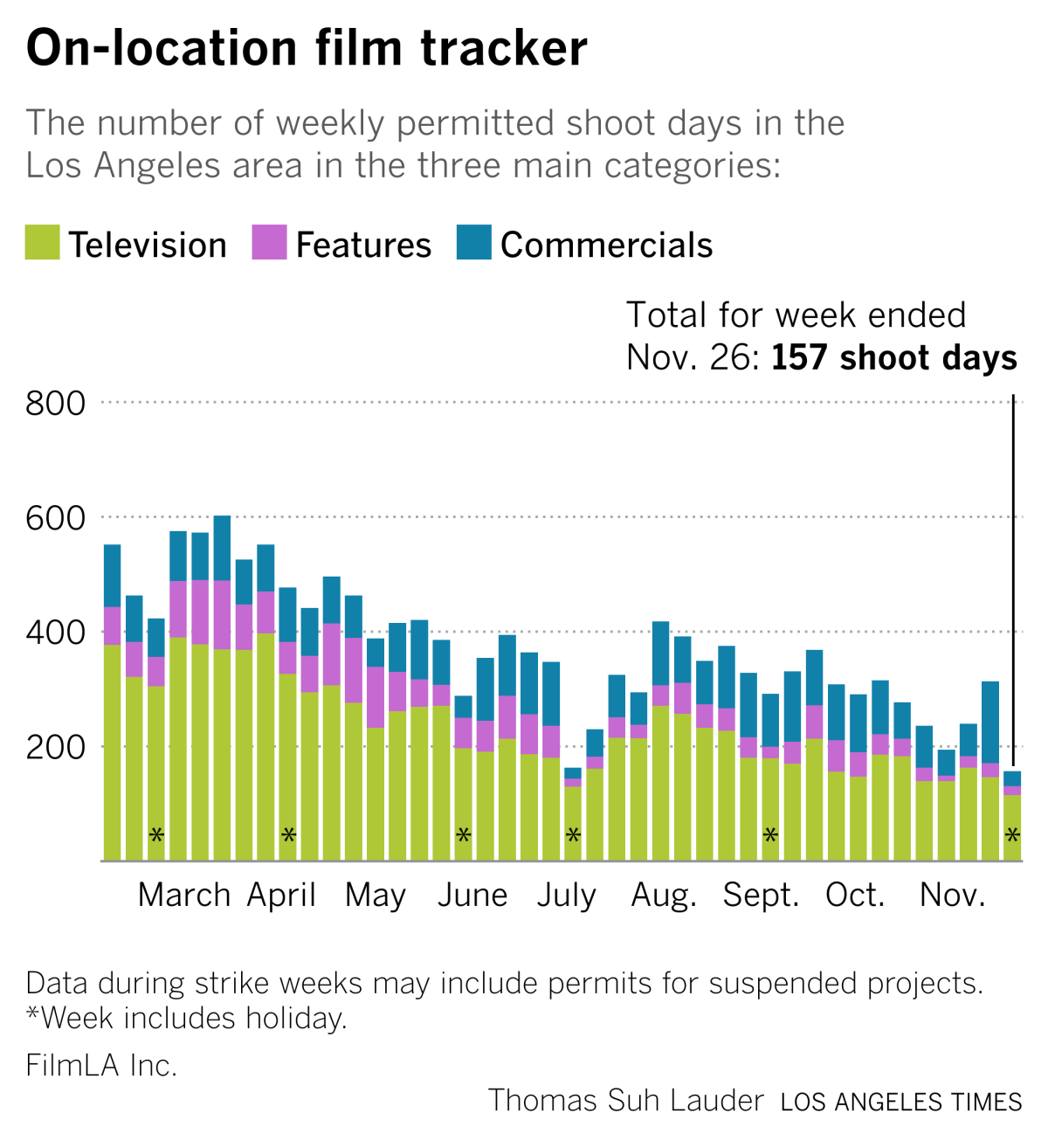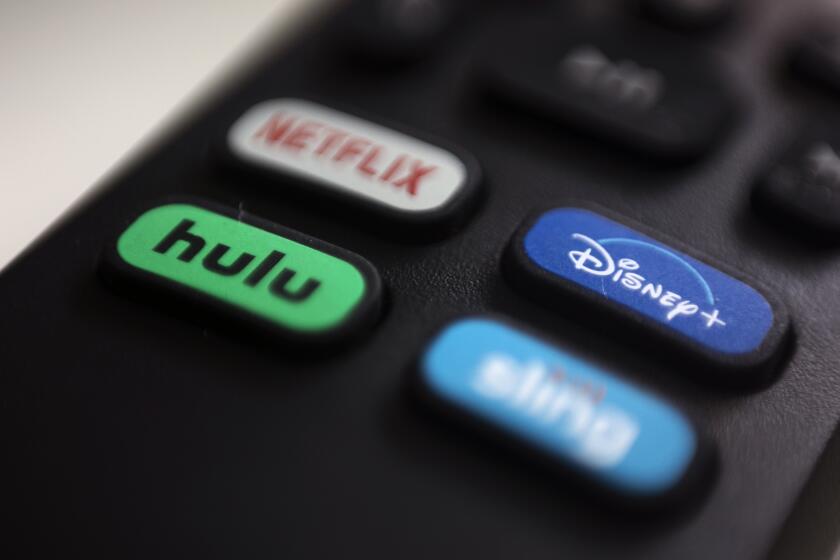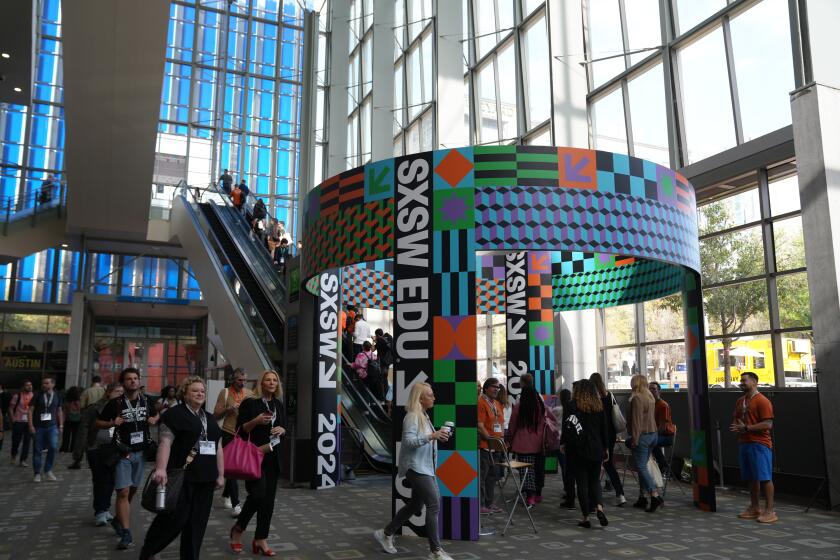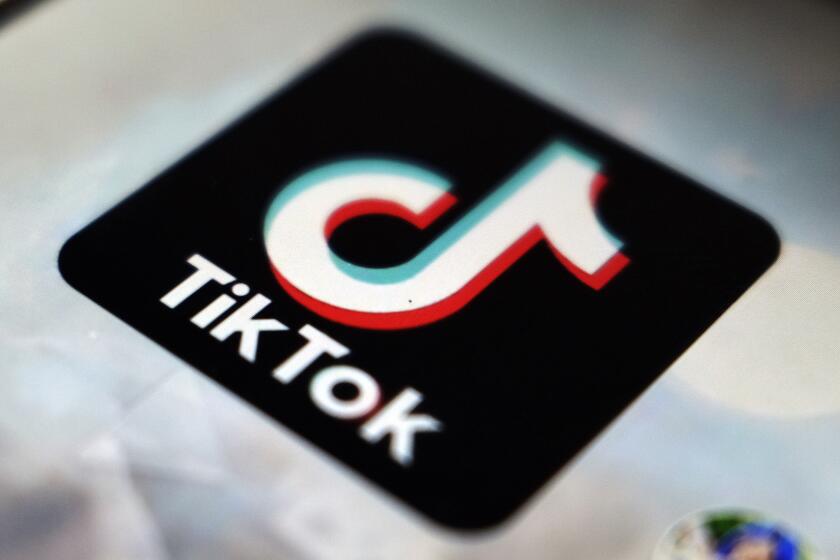Are video games the ‘new comic book movies’ for Hollywood? One producer thinks so

Let’s face it, the entertainment industry’s intellectual property obsession isn’t going anywhere. But it might need to shift focus as many older franchises (“Fast & Furious,” “Mission: Impossible”) demonstrate the challenges of extending their appeal beyond a certain sell-by date.
I recently hosted a panel of Hollywood executives and producers from across the film and television business at The Times’ offices in El Segundo to discuss the state of the business, including what’s going on with intellectual property versus more “original” material, however you define that. We’ll have more from that event in the coming weeks. (Be sure to check back in for the full video; it’ll definitely be worth a watch.)
One of the panelists was Roy Lee, founder of Vertigo Entertainment and a guy who knows his way around I.P., having produced “The Lego Movie” and “It,” but also originals such as last year’s horror hit “Barbarian.”
He sees the success of video game-based movies such as “Five Nights at Freddy’s” ($283 million in global ticket sales) and “The Super Mario Bros. Movie” ($1.36 billion) as an indicator of where studios are turning in order to court Gen Z viewers, who are spending hours playing “Fortnite” and on the Roblox platform. Moreover, young audiences are using those games to interact with more traditional entertainment franchises as studios employ them as marketing tools.
“I think video games are gonna be the new comic book movies of the next generation,” Lee said. “It’s like every video game company now sees what happened with ‘Mario’ and ‘Five Nights at Freddy’s,’ and they wanna get into the game and actually help self-finance the movies, too. So, it’ll be interesting how that goes.”
There’s an argument about the power of originality and newness that gets oversimplified to the point that it’s frequently used as a straw man, so I’ll be extra clear here, out of an abundance of caution. Franchises still dominate the landscape. Superheroes are still a powerful economic force, too, despite some notable blunders from the genre.
Seven of the domestic top 10 films this year are either a sequel, remake or adaptation of a wildly popular existing brand, like current No. 1 “Barbie” (make it eight, if you count Taylor Swift). Three of the top 10 are comic book movies. Just one is a video game adaptation (“Super Mario”).
But the “Five Nights at Freddy’s” example — a PG-13 horror movie from Blumhouse and Universal Pictures — is particularly telling because it’s primarily a young person’s phenomenon. If you polled the typical consumer over 35, I’d bet the vast majority had never heard of the freaky video game property before its opening weekend put it into the headlines. But it’s been a big thing for a while, with gamers streaming playthroughs of the various iterations.
The gamer audience is a key market for the film and TV industry to crack, and there have been some successes — not just “Five Nights at Freddy’s” and “Super Mario,” but also “Uncharted” and, on TV, HBO’s “The Last of Us.” As executives have known for a long time, the gaming business is a growing competitor for people’s attention, as are YouTube, Instagram and TikTok.
A Newzoo study this year estimated that the number of players worldwide will reach 3.38 billion in 2023, growing 6.3% over last year, with mobile contributing most of this growth. The business is expected to reach 3.79 billion players by the end of 2026. The study signaled an uptick in gaming engagement among younger generations, with more people playing games as current players age and new gamers enter the field, my colleague Sarah Parvini wrote.
Apart from “Barbenheimer,” “Five Nights at Freddy’s” has been one of more fun success stories of what has been a fairly downer year in the entertainment business, with two massive strikes and a number of big movies, such as Warner Bros./Legendary’s “Dune: Part Two” and Sony’s upcoming “Ghostbusters” sequel, being delayed to 2024 as a result.
Movies that did stick with their release dates were hobbled by the fact that stars, for the most part, couldn’t promote them. Total box office sales so far this year are $8.24 billion in the U.S. and Canada, 18% behind where they were at the same time in the pre-pandemic year of 2019, according to Comscore.
Disney in particular is having a tough year, having just released “Wish,” which came out to poor reviews and grossed a soft $31.7 million over the long Thanksgiving weekend (it could still recover, like Pixar’s “Elemental” did). “The Marvels” bombed. Auteur-made epics have also struggled in theaters, though at least Ridley Scott’s $200-million-plus “Napoleon” did better than expected.
We wrote last week about how the industry is becoming increasingly risk-averse amid the uncertain climate for theatrical movies and the rapid decline of linear television. Industry insiders have said the number of scripted shows will decrease by about 20% next year from pre-strike Peak TV levels, bringing the total to about 480.
That evolution was clearly on the minds of our panelists, who in addition to Lee included Jonathan Glickman (founder, Panoramic Media Co.), Sam Register (president, Warner Bros. Animation), Nicole Brown (president, TriStar Pictures), FredAnthony Smith (vice president, non-scripted, SMAC Entertainment) and Chris Hart (partner and co-head of talent, United Talent Agency). More to come from all of this.
“I don’t think it’s as simple as ‘great content will always get there.’ Because there are fewer buyers,” said Glickman, whose recent work includes the Netflix hit “Wednesday” and Amazon-MGM’s “Creed III.”
“I certainly think, especially on the theatrical side... people are very concerned about what it means to spend that kind of money marketing a film, much less making a movie,” Glickman said. “And I think that the notion of taking shots and risks, which create the new franchises... I mean, you can go look at the movies we all love that were passed on by five studios. It’s the stuff that’s outside of the mainstream that ends up becoming the mainstream.”
But even as the business becomes more challenging, one of the reasons some panelists gave for optimism was that audiences do often seem to reward films that fill a need in the culture, including by delivering for under-served audiences with creative marketing, whether that’s middle America or faith-based audiences (for lack of a better description) with “Sound of Freedom,” or teenage girls with “Taylor Swift: The Eras Tour.”
“I think that what we’re seeing is that audiences are driven by original,” said Brown, whose TriStar unit most recently released Eli Roth’s original slasher flick “Thanksgiving” ($29 million worldwide on a modest budget). “They’re driven by things that feel fresh and culturally relevant and culturally urgent. And I think that... Like even [Lee] said that video games are the new comic books. I think audiences are looking for what’s new.”
You’re reading the Wide Shot
Ryan Faughnder delivers the latest news, analysis and insights on everything from streaming wars to production — and what it all means for the future.
You may occasionally receive promotional content from the Los Angeles Times.
Stuff we wrote
L.A. prop houses prepare for the return of production after dual Hollywood strikes. Los Angeles prop houses took a huge hit during the Hollywood writers’ and actors’ strikes. Now they’re preparing for the return of production.
Fox News’ Sean Hannity on his unlikely relationship with Gavin Newsom: ‘We just hit it off’. After the success of their recent meetings, Sean Hannity invites California Gov. Gavin Newsom to debate Florida Gov. Ron DeSantis on his Fox News show Thursday.
UTA drops actor Susan Sarandon amid Israel-Hamas war. Sarandon received some backlash after making comments at a pro-Palestinian rally earlier this month as Hollywood grapples with how to deal with sharply divided opinions on the conflict. “Scream VII” actor Melissa Barrera was fired from the upcoming project after the producers deemed that some of her social media posts had crossed the line into antisemitism.
The music industry is finally having its #MeToo moment. Alexa Nikolas, founder of activist group Eat Predators, on the “miracle” of Cassie’s lawsuit against Sean “Diddy” Combs and the challenges still facing abuse survivors.
Film shoots
Yeah, the week of Thanksgiving is not a busy one for film and TV production.

Best of the web
— Former CNN boss Jeff Zucker nears a major deal to re-enter the news business, according to the New York Times. “The veteran TV executive is poised to take control of two prominent British news outlets, The Daily Telegraph and The Spectator, and may expand them into America.”
— So... what’s going on with Sports Illustrated and AI here? (Mediaite)
— Spotify says changes to its royalty system will bring more revenue to artists and away from fraudsters and random “white noise” tracks. But some independent artists are nervous. (The Guardian)
— I’ve enjoyed much of the coverage of the OpenAI/Sam Altman fiasco, but none more than the frazzled and sleep-deprived “emergency” recaps from the Hard Fork podcast.
— A great Dolly Parton interview in Vulture.
— The strange $55-million saga of a Netflix series you’ll never see. After suitors flocked to a sci-fi project by Carl Rinsch, director of a single movie (“47 Ronin,” yikes), “the winner handed over money and control. They’re still fighting.” (NYT)
Finally ...
I decided last minute to check out drone metal duo Sunn O)))’s stripped-down set at the Belasco in downtown L.A. on Sunday night, and I think my brain is still vibrating from the decibels coming from their wall of amps.
Cinephiles should enjoy The Times’ interactive map of the 27 best movie theaters in Los Angeles. I’m glad Quentin Tarantino managed to reopen the newly refurbished Vista Theatre in time for the feature.
The Wide Shot is going to Sundance!
We’re sending daily dispatches from Park City throughout the festival’s first weekend. Sign up here for all things Sundance, plus a regular diet of news, analysis and insights on the business of Hollywood, from streaming wars to production.
You may occasionally receive promotional content from the Los Angeles Times.




